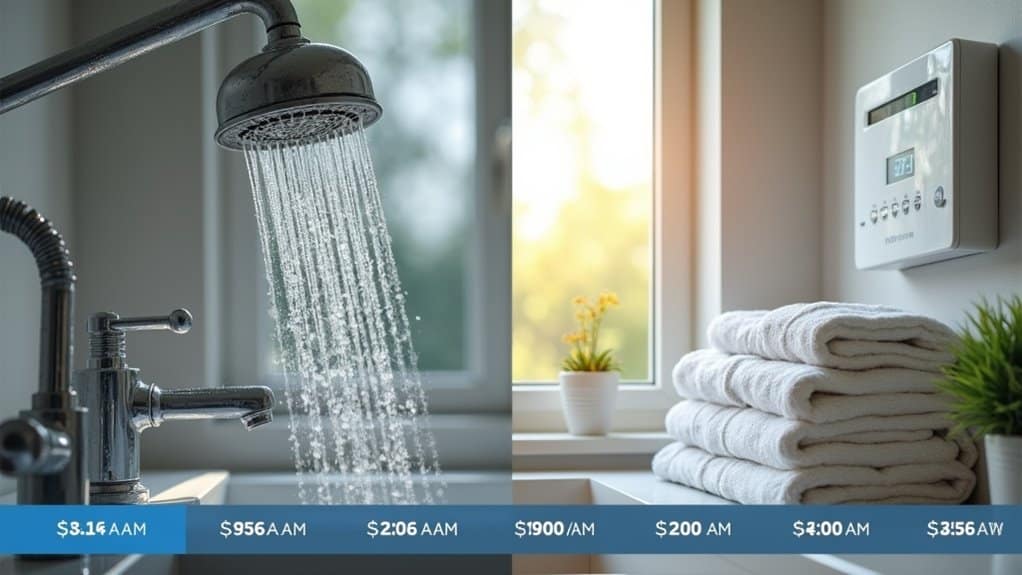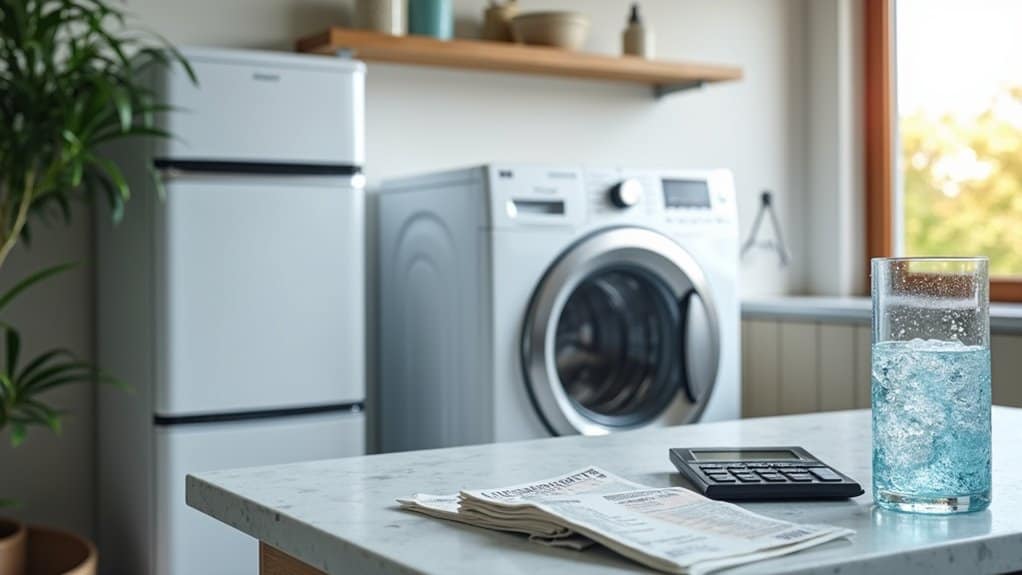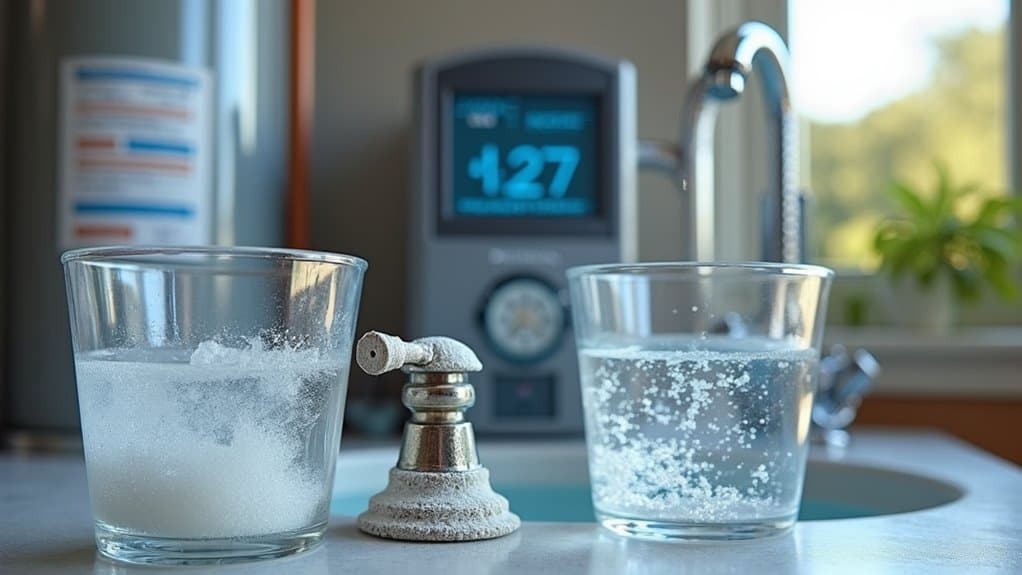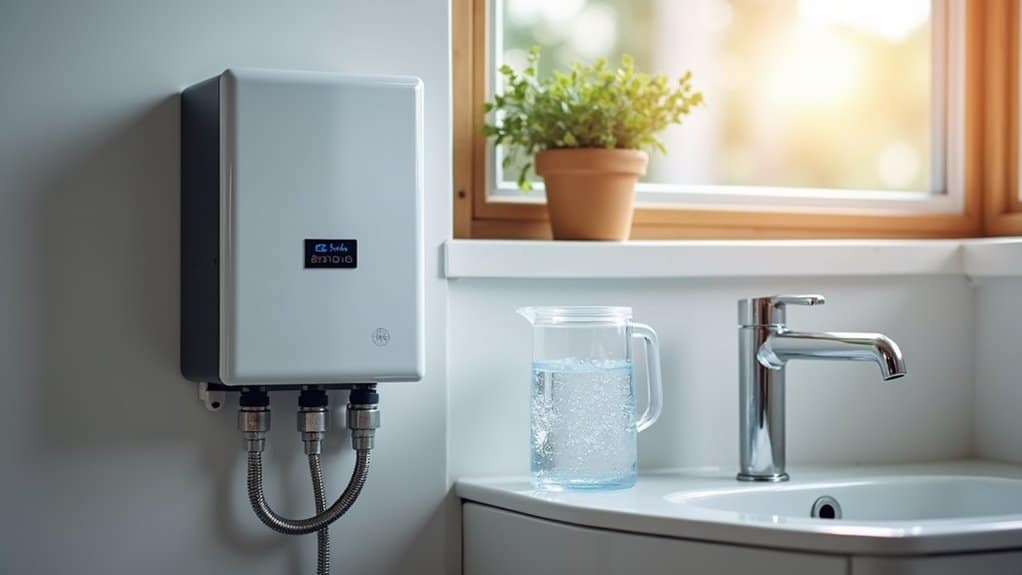We’ve found that quality water softeners typically pay for themselves within just 3 months through substantial savings. Hard water increases energy bills by approximately 29%, reduces water heater efficiency, and shortages appliance lifespan. By switching to soft water, you’ll save $30-$50 monthly on cleaning products while extending appliance life by 20-30%. Our ROI calculation confirms the 90-day payback through reduced maintenance, energy, and replacement costs.
Key Takeaways
- Water softeners reduce monthly energy bills by up to 29% through improved appliance efficiency.
- Users save $30-$50 monthly on cleaning products with soft water systems.
- Hard water causes up to 48% efficiency loss in gas water heaters, quickly offsetting installation costs.
- The 90-day payback comes from combined savings on energy, detergent, and appliance maintenance.
- Water softeners extend appliance lifespans by 20-30%, preventing $500-1,500 in premature replacement costs.
The Hidden Costs of Hard Water: A Monthly Breakdown

While many homeowners focus solely on the upfront cost of water softeners, they often overlook the substantial ongoing expenses that hard water silently imposes on their household budgets.
We’ve found that hard water increases monthly energy bills by approximately 29% as appliances struggle to operate efficiently. This inefficiency can be alleviated with a water softener system, which helps to optimize appliance performance.
Water heaters lose 4% efficiency for every 5 grains of hardness, with gas units experiencing up to 48% efficiency reduction. This translates to 40-57% higher heating costs.
Additionally, appliances require frequent repairs due to mineral buildup, with dishwashers and washing machines deteriorating prematurely, creating recurring $500-1,500 replacement costs.
Hard water causes white chalky deposits on faucets and showerheads, which not only look unsightly but also indicate potential damage occurring inside your plumbing system, leading to increased maintenance costs and repairs.
Beyond the Price Tag: How Soft Water Delivers Ongoing Value

When evaluating water softener investments, homeowners must consider value beyond initial purchase costs. The financial benefits accumulate across multiple household systems simultaneously.
We’ve documented how appliances like water heaters and washing machines operate more efficiently and last years longer without mineral buildup. This translates to measurable savings: $30-$50 monthly on cleaning products, reduced energy consumption, and fewer repair calls.
The technical advantages extend to plumbing infrastructure, where soft water prevents costly clogs and pipe degradation. Quality water softeners can provide these benefits for up to 15 years with proper maintenance.
Additionally, households experience tangible quality-of-life improvements—from healthier skin and hair to spot-free glassware and cleaner fixtures.
Calculating Your ROI: The 90-Day Payback Formula

Nearly every homeowner we’ve consulted wants to know exactly when their water softener will “pay for itself.”
Our 90-Day Payback Formula provides this precise calculation by quantifying five critical financial levers that accelerate return on investment.
The formula captures immediate savings through:
- Energy efficiency gains of 10-30% on water heating costs
- 50% reduction in detergent usage and 20% in cleaning supplies
- Extended appliance lifespan of 20-30%, delaying replacement costs
- Maintenance cost reduction through scale prevention in pipes and fixtures
Additionally, investing in a water softener can lead to significant savings over time, as it reduces wear on plumbing systems and appliances.
Our user-friendly calculator helps determine your potential ROI with flexible payment options tailored to accommodate various budgets.
When properly assessed, these combined savings typically exceed your initial investment within just 90 days, making this purchase decision remarkably straightforward.
Frequently Asked Questions
What Size Water Softener Do I Need for My Home?
We’ll need your water hardness level (GPG) and household size to determine the proper softener size. For average families, 32,000-48,000 grain systems typically suffice depending on water hardness.
Can a Water Softener Affect My Water Pressure?
Yes, water softeners can affect pressure. We find poorly sized units, clogged resin beds, or blocked filters typically cause pressure drops. Regular maintenance and proper sizing prevent most pressure-related issues.
Is Softened Water Safe for Plants and Pets?
We find softened water isn’t ideal for all plants due to increased sodium levels. However, most pets tolerate it well, though fish may be sensitive. Consider using untreated water for sodium-sensitive vegetation.
Do I Need to Adjust My Water Heater After Installation?
Yes, we recommend draining and flushing your water heater after softener installation to remove sediment. Also check T/P valves for leaks and inspect anode rods, as softened water can accelerate their corrosion.
How Often Should I Test My Water Softness Levels?
We recommend testing your softness levels monthly after installation, then quarterly once stabilized. Test immediately if you notice soap scum returning, spotty dishes, or changes in water quality.
Conclusion
We’ve demonstrated how this affordable water softener delivers exceptional value beyond its initial investment. By eliminating hard water’s hidden costs—from extended appliance lifespans to reduced cleaning product usage—the financial benefits accumulate quickly. Our ROI calculations confirm most households achieve complete payback within just 90 days. When you factor in the improved water quality and efficiency gains, this solution represents one of the most practical home improvement investments available today.

Craig “The Water Guy” Phillips is the founder of Quality Water Treatment (QWT) and creator of SoftPro Water Systems.
With over 30 years of experience, Craig has transformed the water treatment industry through his commitment to honest solutions, innovative technology, and customer education.
Known for rejecting high-pressure sales tactics in favor of a consultative approach, Craig leads a family-owned business that serves thousands of households nationwide.
Craig continues to drive innovation in water treatment while maintaining his mission of “transforming water for the betterment of humanity” through transparent pricing, comprehensive customer support, and genuine expertise.
When not developing new water treatment solutions, Craig creates educational content to help homeowners make informed decisions about their water quality.


